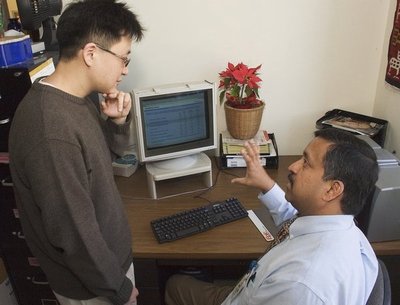January 31, 2008
Mental health screening now available online
With a few clicks of your mouse on the UW Web site, you can check out hours for the Intramural Activities center, find out how much storage you have left in your UW e-mail account and buy tickets for an upcoming show at Meany Hall.
In the ever-expanding realm of online offerings, UW students, faculty and staff can also now take an online mental health assessment that screens users for depression, anxiety, attention deficit/hyperactivity disorder, eating concerns and substance use.
The tool, launched last May, was created in part to address increasing numbers of patients seeking mental health evaluations at Hall Health Center.
UW statistics show that since 2001, that number of patients has increased by 184 percent. “More students are seeking help who need help,” said Anil Coumar, director of Hall Health’s Mental Health Clinic. Coumar said improved medications have also contributed to the increase. Without modern-day pharmaceuticals, some students would not have been able to function on a hectic college campus today.
Hall Health’s Mental Health Clinic was among the first college centers in the country to go online with some of its services in 1996, said Coumar.
Many students seek mental health information online and with the stigma that is still frequently attached to related counseling and services, an online tool helps students and others get in the door — even if it is a virtual door of sorts.
“Online searching happens at night, and we are closed, so how do we provide access?” said Coumar. In addition, a lot of students only have cell phones which they turn off while in class. This leads to a lot of phone tag and potential delays in getting an appointment scheduled.
The clinic’s online tool is among the first of its kind across the country on a college campus, with a three-pronged approach to screen for a possible mental health issue and, subsequently, allow the patient to register for an appointment and complete an initial intake form.
Coumar said having patients complete the intake form prior to the first visit helps to ensure the meeting will be more productive. National statistics show one-quarter of students who visit a mental health clinic only come for one session, he noted. This is a way to maximize the time with them.
Bioengineering graduate student Eung-Hun Kim designed the screening tool for the Mental Health Clinic. He had previously worked on a Personal Health Information Management System project (including a referral system) initiated in 2002 at the UW Bone and Joint Center. Subsequently, the health information system was deployed at the Everett Housing Authority in December 2004 and March 2006, and at the UW Regional Heart Center as a clinical tool in January 2006.
In addition to Hall Health’s Coumar and Dr. Becky Greenberg, Dr. Yongmin Kim, bioengineering, and Dr. Bill Lober, of the schools of nursing and medicine, have served as advisors for Kim. Hall Health’s Scott Mobus also helped to improve the system on the clinical end.
Kim’s interest in mental health stems in part from his own personal struggles. After experiencing injuries and related illness years ago, he said he felt like he was depressed. “I needed a system to evaluate mental health,” he said. In addition, Kim — while looking pretty youthful himself at age 32 — said he wanted the screening tool available for the younger generation. “I strongly believe this tool could really benefit young college students,” he said.
Statistics so far reveal the screening tool is indeed already beneficial. As of the end of December, 465 individuals tried out the screening tool and nearly 200 referrals for services were initiated (with little to no advertising to date). More than 90 percent of patients who initiated referrals had screening scores above typical thresholds, said Kim. Monday and Tuesday are the most popular days of the week for individuals to try out the screening, with peak times for users at 11 a.m. and at 2, 4 and 8 p.m.
User feedback has also been positive.
“The online survey/referral system was a big part of me taking the action to go see a counselor,” said one anonymous visitor. “I’ve often thought of calling to try and find a counselor to talk to, but somehow I always put it off or get too busy,” said another user.
“This was convenient to be able to make the referral request from home when it was on mind. Thank you,” the person added.
For more information, visit www.hallhealthcenter.com, and click on “mental health.”



